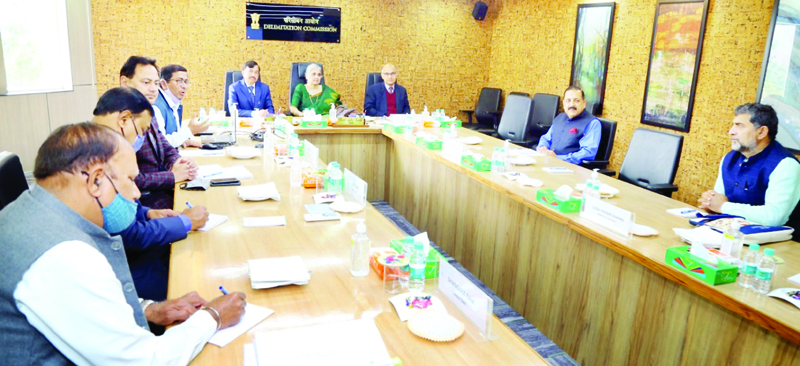
Not a platform for political posturing: Dr Jitendra
Excelsior Correspondent
JAMMU, Feb 18: The Delimitation Commission on Jammu and Kashmir held its first meeting in New Delhi today which was boycotted by its three associate members belonging to the National Conference including former Chief Minister Dr Farooq Abdullah, a move that evoked sharp reaction from Union Minister of State in the Prime Minister’s Office (PMO) Dr Jitendra Singh, who is also an associate member and lashed out at the NC for its “duplicity”.
The Commission, headed by former Supreme Court Judge Ranjana Prakash Desai, met to seek suggestions from the associate members on the process of delimitation of the Union Territory of Jammu and Kashmir.
The meeting was attended by Dr Jitendra Singh, who is an MP from Udhampur-Doda Lok Sabha seat and Jammu-Poonch MP of BJP Jugal Kishore Sharma, Sushil Chandra, Election Commissioner and KK Sharma, State Election Commissioner, both ex-officio members.
Lok Sabha Speaker Om Birla had last year named Parliamentarians Dr Farooq Abdullah, Mohammad Akbar Lone, Hasnain Masoodi of the National Conference and Dr Jitendra Singh and Jugal Sharma of the BJP as the Panel’s associate members from Jammu and Kashmir.
All three NC members had already announced that they will dissociate from the meeting on the ground that Jammu and Kashmir Reorganization Act under which the Delimitation Commission has been set up is under judicial scrutiny.
Dr Jitendra Singh and Jugal Sharma told the Delimitation Commission that special attention be given to the difficult terrain while carrying out the delimitation exercise in the Union Territory.
Associate members are lawmakers from their respective States/UTs, who assist the Delimitation Panel in redrawing Parliamentary and Assembly constituencies.
According to an official statement, while the Commission had given written intimation to all five associate members on February 5, only Dr Singh and Sharma attended today’s meeting.
“An overview on the process of delimitation based on the Jammu and Kashmir Reorganization Act, 2019 and Delimitation Act, 2002 was presented before the members detailing various Sections of these Acts related to the delimitation exercise of the Union Territory of Jammu and Kashmir,” the statement said.
After the meeting, Dr Jitendra Singh told reporters that some members didn’t turn up at the meeting and added, “It’s a delimitation exercise, not a platform for political posturing nor does it get registered with the EC.”
Dr Singh said the Commission is a constitutionally constituted body.
“Any stand taken against it is itself unconstitutional. When a member refuses to attend the meeting, he is denying the voices of his electorate being heard in this forum,” he said.
“On the one hand, these members stand up in Parliament and say that we should have an elected Legislative Assembly in J-K at the earliest. But when a positive headway is made in that direction, they refuse to cooperate. For this duplicity, they owe an answer to the electorate who have sent them to Parliament,” said Dr Jitendra Singh and added that the first meeting went well.
“Jammu and Kashmiri Delimitation Commission meeting went off with mutually shared inputs in a cordial atmosphere. Found the members including Chairperson, Justice Ranjana Prakash Desai receptive to the suggestion offered,” he added.
In the meeting, Dr Jitendra Singh and Jugal Sharma appreciated the Commission’s efforts and suggested that delimitation of constituencies should be, as far as practicable, for geographically compact areas, the statement said.
They said while delimiting the constituencies, regard should be given to physical features, the existing boundaries of the administrative units, facilities of communication and public convenience.
They also suggested to the panel to give special attention to the difficult terrain while carrying out the delimitation exercise in the Union Territory.
Set up last year, the Commission will delimit the constituencies of Jammu and Kashmir in accordance with the provisions of the Jammu and Kashmir Reorganization Act, and those of Assam, Arunachal Pradesh, Manipur and Nagaland in accordance with the provisions of the Delimitation Act, 2002.

